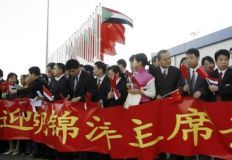China’s Hu visits Sudan, presses on Darfur
Feb 2, 2007 (KHARTOUM) — President Hu Jintao pledged a new level of cooperation between Beijing and its third-largest African trading partner at the start of the Chinese leader’s first visit to Sudan on Friday.

Western leaders had hoped Hu would use his trip to press Sudanese President Omar Hassan al-Bashir to accept U.N. peacekeepers in Darfur and resolve the four-year conflict in Sudan’s vast west.
Hu told Bashir “Darfur is a part of Sudan and you have to resolve this problem”, a source present during Friday talks between the two leaders said.
But Hu’s two-day visit, which includes a trip to a Chinese-built oil refinery, was expected to focus more on growing economic links than on bringing peace to western Sudan.
“I am confident this visit will facilitate a strengthening of the traditional friendship between China and Sudan and bring cooperation between the countries to a new level,” Hu said in a statement, which also mentioned strengthening economic ties.
Hundreds of people waving banners that read “Welcome Hu Jintao, welcome to Sudan” lined the streets of the capital, festooned with Sudanese and Chinese flags.
Thousands of Chinese expatriates live in Sudan, working on construction projects and in Sudan’s budding oil industry.
At the refinery Hu was due to visit, around 75 km (47 miles) north of Khartoum, hundreds of uniformed Chinese workers wearing yellow and blue hard hats lined up in advance to greet him.
Security was tight at the site, a compound of sparkling new buildings, tarmac roads, and rows of new cars. The refinery processes around 100,000 barrels of crude per day.
Sudan’s Islamic government, under U.S. sanctions, has relied on its Asian ally to expand oil production to 330,000 barrels per day and build key infrastructure like dams and roads.
Sudan’s economy has benefited from Chinese and Asian funds, and is expected to grow up to 13 percent this year.
In November Sudan was China’s fourth-largest source of crude imports, and bilateral trade stood at $2.9 billion in the first 11 months of 2006, Chinese figures show, behind South Africa and Angola.
“NO STRINGS ATTACHED”
China’s “no strings attached” aid policy throughout Africa has raised concern in the West. Western officials say it could undermine efforts to link good governance, accountability and protection of human rights to financial aid and cooperation.
China’s approach has raised special concerns in Sudan.
The United States in particular has pressed China to use its economic muscle to persuade Khartoum to end atrocities in its Darfur region, where four years of war have killed about 200,000 people and driven 2.5 million from their homes.
Sudan sells much of its crude to China. Chinese arms are used by all sides in the Darfur conflict, despite an arms embargo on the region.
China also provides diplomatic protection for Sudan on the U.N. Security Council, which is engaged in a standoff with Khartoum over a U.N. peacekeeping mission for Darfur.
“The blunt truth is China hasn’t begun to use any of the irresistible diplomatic, economic and political leverage it has with the Khartoum regime,” said U.S. Darfur expert Eric Reeves.
“And until it does, there will be … no halt to the intolerable deterioration in security for civilians and humanitarians.”
China will host the 2008 Olympics, and human rights activists are campaigning for a boycott of the Games if China does not use its permanent seat on the Security Council to put pressure on Sudan to accept U.N. peacekeepers in Darfur.
Hu is on an eight-nation tour of Africa to strengthen ties in a period marked by huge Chinese demand for raw materials for its rapid industrial expansion.
(Reuters)
